® "MUNICIPAL SOLUTIONS" IS A REGISTERED TRADEMARK | © 2023 PRIVACY & USE POLICY
FOLLOW US
® "Municipal Solutions" is a registered trademark in the US and in several states. Use without express permission is prohibited by law.w.

CABLE TV,
TELECOMMUNICATIONS, WI-FI & WIRELESS
When facing the global economy, your community better have a plan.

"Because of Municipal Solutions' extensive knowledge and background in cable TV and telecommunications, their review and update of our franchise fees helped us avoid a 10-year loss of more than $700,000."
~Huey Long, City Manager
City of Safford, AZ
Municipal Solutions® consultants make sure your franchise negotiations consider all of the key elements including:
Local Constraints: What are the current limits to your existing communications infrastructure? Does your incumbent video provider want to serve new developments? Are competitors creating exclusive, anti-competitive arrangements with developers at the expense of the consumer? Are your proposed buildout requirements 'reasonable' as defined by the FCC?
Revenues: Federal law allows communities to receive up to 5% of the provider's gross revenues to use the public right of way and for operating in the community. Does your community assist the local incumbent provider to improve their local coverage and attract a greater local customer base? Which gross revenue is greater: 5% of 2,500 customers or 5% of 5,000 customers?
Bundled Services: Most providers offer a variant of bundled services including VoIP, Cable TV, Telephone, and Internet. How are your local providers offering broadband services? Do they meet the demand of your residents and businesses? You may be surprised!
Technical, Legal & Financial Capability: Is your local provider on the verge of bankruptcy, merger or acquisition? Does your local franchise agreement appropriately address these issues? Can they provide the services yoru community needs to succeed in a global economy?
When is the last time you conducted a periodic or formal audit the provider? What does your current franchise agreement allow for conducting a formal audit during the term of your current franchise? Does a new applicant have it together?
Bonding, Liability, Warranty: Community right-of-way must always be protected. Do your providers have the ability to assure protection of community property? Are they adequately insured? Bonded? Licensed?
Breach and Remedies: We have discovered $ millions of uncollected liquidated damages for unfulfilled requirements!!!
Other issues: Monthly / Quarterly Reports; Community Access Channels, Co-location and Joint Trenching; standardized Construction Standards and more!
CABLE TV & TELECOMMUNICATIONS FRANCHISES
Our consultants have more than 60 years combined experience managing complex franchise negotiations, including:
Acquisitions & Bankruptcies
Cable TV, Telecom
Developer-driven Agreements
Mergers
Multiple-providers / partners
Pole Attachments
Negotiation success comes from understanding how federal and local law enables or restricts stakeholders in the negotation process. If managed correctly, both providers and local governments can come our winners!
Local government negotiations have allowed us to develop industry insight of the following companies:
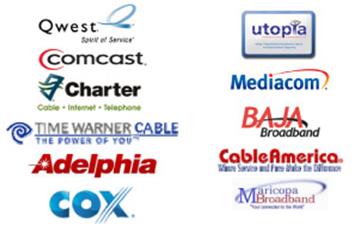
right click to enlarge
COMMUNICATIONS ASSESSMENTS
& STRATEGIC MASTER PLANS
Problem: Too many communities fail to reach their economic development potential due to a lack of communications infrastructure and affordable services. State and local governments can have a significant impact on communications services, but market failures need to be understood before government takes action.
4 Prudent Roles include:
CATALYST - Educator / Incubator
ENABLER - Co-location / Lease of Public Assets
FACILITATOR- Conduit Provider, Zoning, Aggregation
RETAILER- Direct Competition to Service Providers
The model below helps government decide on a prudent intervention:
When your community faces the opportunity to improve its communications infrastructure, you need to have a clear strategy. Municipal Solutions® assists you in developing and implementing a community communications strategy.
Our services include:
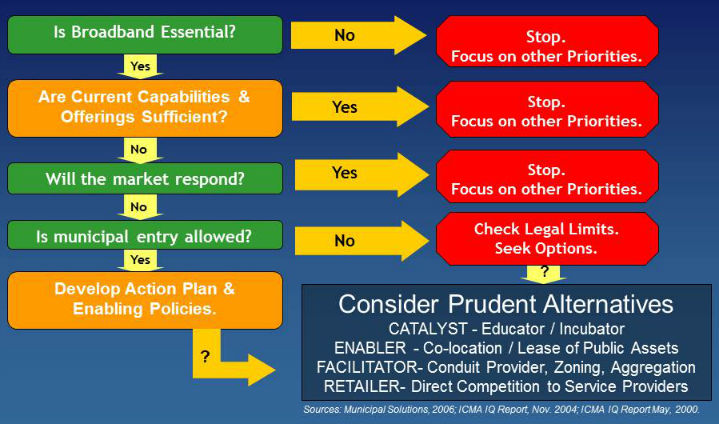
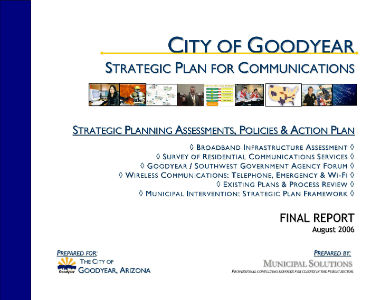
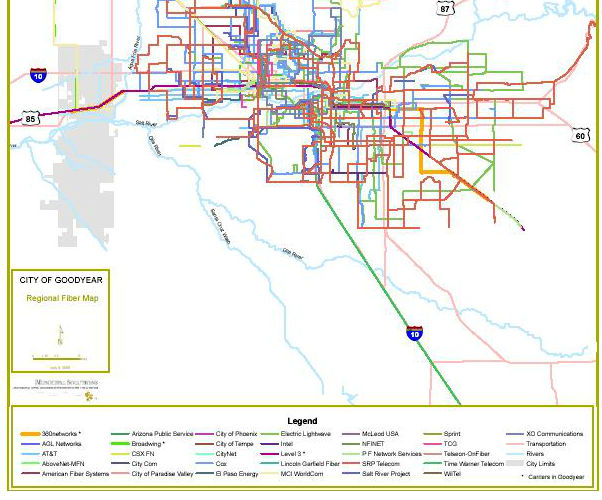
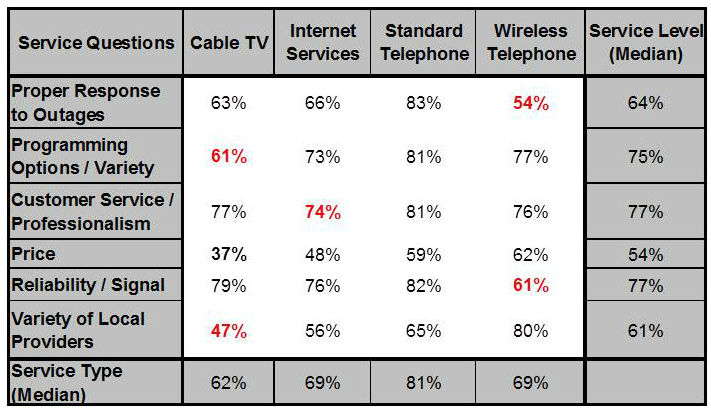
1. Infrastructure Assessment
Knowing who owns the communications infrastructure in your community is as important as knowing who owns the water, gas or electricity infrastructure. Developing and maintaining a comprehensive inventory of communications infrastructure is the first step to determining whether there is a market failure, and whether government should play a role in addressing it.
right click to enlarge
2. Survey of Business & Resident usage
Understanding the demand for service is an essential step before policy-makers should consider using public resources to improve local communications services.
right click to enlarge
3. Regional Public Agencies Summit
While conducting the communications infrastructure assessment and demand survey phases for your city are important, it is often discovered that other public agencies are also in need for affordable high-speed telecommunications.
Summit participants should include:
Local Governments,
State Agencies,
County Agencies,
Regional Council of Government,
Regional Utilities (publis and private),
Local Schools / School Districts, and
Universities
Aggregation of demand will often increase provider awareness, improve service delivery, expedite service expansion & improve price.
4 Review of Documents, Policies & Plans
Many communities have so many plans and ordinances, they are unaware when they conflict - diminishing their capacity to impact / improve local communications infrastructure and services. A careful review of relevant documents will produce a clear picture where local and regional policies and plans might conflict. Examples from a previous project are illustrated below:
Studies
MAG Regional Community Network Study (2003)
Wireless Antenna Siting Study (August 1998)
Community Survey (2006)
2005 Impact Fee Study
Codes, Licenses & Ordinances
Zoning Ordinance: Article 4
Engineering Standards & Standard Details
Construction Permit Fees
Dimension / Cox Cable License Agreement
Development / Engineering / Planning Guides
2003 – 2013 General Plan (November 2003)
Employment Corridor Plan
Information Technology Strategic Plan (Jan. 2006)
FY 2006 / 2007 Budget
5-year Capital Improvements Program
Technology Assessment & Strategic Plan (2002)
5. Develop a formal Policy & Action Plan
Every community can play an important role to assure residents and businesses have what they need to succed. A local policy should:
- Adoption of ‘Standards-based’ Networks
- Establish Minimum Residential Standards
- Establish Minimum Commercial Standards
- Modify Right of Way Requirements
- Create Options for Service Providers
- Innovation of Applications and Services
“Coordination and communication of agency telecommunications capacity is lacking at every level of government. It is crucial that ongoing interagency communication occurs to prevent duplication of effort and ensure intelligent planning.”
~Summit Participant

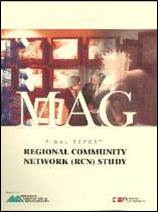

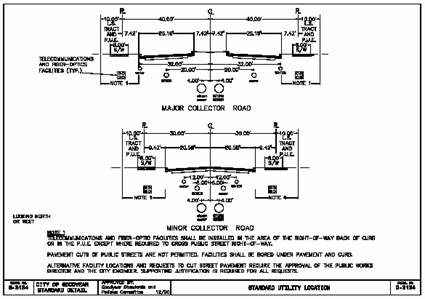
Convergence
As Media, Technology & Telecom companies want market dominance, and it is essential that public administrators and elected officials protect their community’s future.
right click to enlarge
Effective communications masterplanning resuires 5 essential steps to assure that a local government's efforts are a success. These 5 steps include:
1. ASSESSMENT: Infrastructures & Services
2. SURVEY: Business & Residential
3. SUMMIT: Regional Public-Agencies
4. DOCUMENT REVIEW: Documents & Plans
5. POLICY & STRATEGIC ACTION PLAN
Failure to follow these steps have produced many projects which have resulted in public embarrassments and financial / political disasters.
5 Key steps for successful development of a communications masterplan are described below:
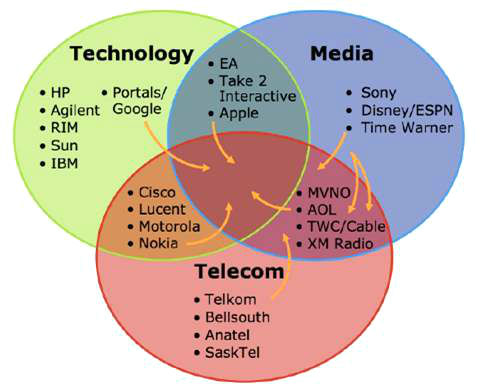
Community Intervention: Perspectives Vary. What are the Dominant Perspectives?
1. Municipal Government*
2. Private industry Consumers: Commercial & Industrial
3. Private Industry Provider: Telecom, Cable & Wireless
4. Other Public Agencies
5. Local Businesses & Residents
6. State Legislatures
7. Federal Government
* Generally the most comprehensive, multi-faceted and responsive.
Common mistakes Local Government makes
They Don’t Know What They Don’t Know
No Coordinated Planning
They Wait Too Long
They Fail to Recognize Opportunities
They Oversimplify
Measurable success is possible
Municipal Solutions consultants help 100s of local government officials assure success for their communities. We help you to:
- Take a leadership role in your community
- Create Confluence
- Develop and adopt a Communications Policy
- Develop a Communications Master Plan
- Facilitate open dialogue from multiple sources
- Evolve Initiatives
- Actively support legislation that preserves local authority / regulatory control over rights-of-way.
- Educate you and your constituents on the products, services and alternatives and what outcomes are to be expected (example: Wi-Fi).

Password: